Flowers come in all shapes and sizes but some are truly massive. The top 10 biggest flowers in the world are truly awe-inspiring. The Rafflesia Arnoldii is the largest flower in the world and can grow up to three feet across and weigh as much as 15 pounds.
Another large flower is the Titan Arum which can grow up to three meters tall and has the smell of rotting flesh. The Corpse Flower is another large flower found in the rainforests of Sumatra and can reach up to 10 feet tall. The Chilean Wine Palm flower is also a large flower and can grow up to 8 feet tall. The Lotus is another large flower that grows in ponds and can reach up to 3 feet in diameter.
Other large flowers include the Borneo Giant Flower, the Hydrangea, the Passion Flower, the Amazon Water Lily, and the Sunflower. These amazing flowers are a true testament to the beauty and power of nature.
Biggest Flowers in the World
Magnolia
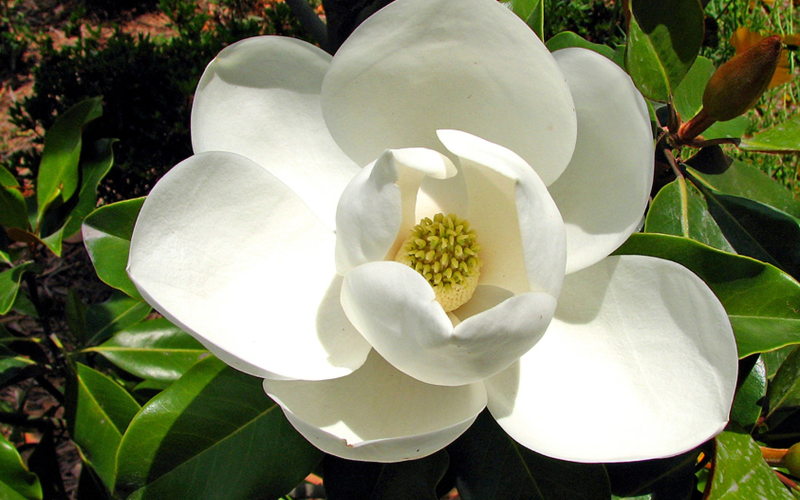
Magnolia is a beautiful and popular flowering plant that is native to Asia and the Americas. It is a very old genus, with fossils dating back to the Tertiary period, over 20 million years ago. The Magnolia tree produces large, showy flowers that range in color from white to pink, purple, and even yellow.
These flowers are often fragrant and can fill the air with a delightful aroma, making them a popular choice for gardens and landscaping. Magnolia trees are also known for their glossy, dark green leaves that provide a striking contrast to the bright, colorful flowers. These trees are also hardy and can thrive in a variety of conditions, making them a great addition to any garden or landscape design.
| Scientific Name | Magnolia |
| Native Range | North America, Central America, South America, and parts of Asia |
| Flowering Season | Spring and early summer |
Hibiscus
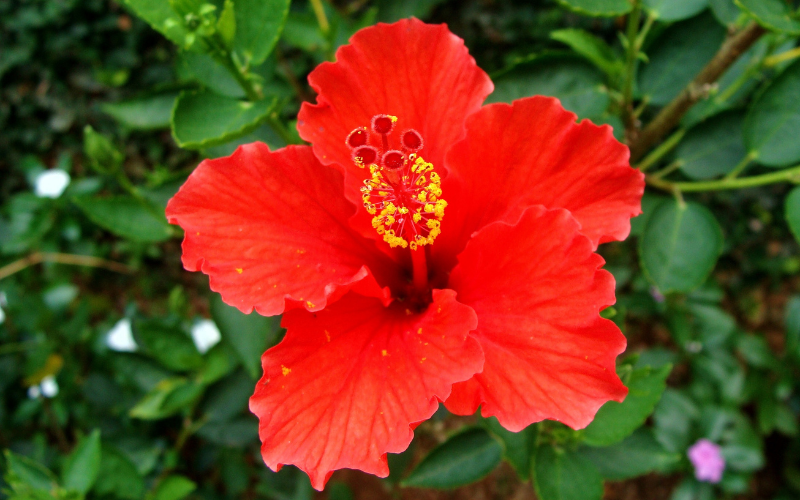
Hibiscus is a beautiful plant with colorful and vibrant flowers that bloom in a wide range of colors such as pink, red, yellow, and white. It is a popular plant among gardeners and landscape enthusiasts due to its ability to thrive in both tropical and subtropical regions.
The flowers of the hibiscus plant are not only visually pleasing but also have a variety of health benefits. Hibiscus tea, made from the dried flowers of the plant, has been shown to help lower blood pressure and cholesterol levels, as well as aid in weight loss efforts. In addition to its health benefits, the hibiscus plant is also used in traditional medicine to treat a variety of ailments.
| Scientific Name | Hibiscus rosa-sinensis |
| Native Range | Asia |
| Flowering Season | Spring and summer |
Sunflowers
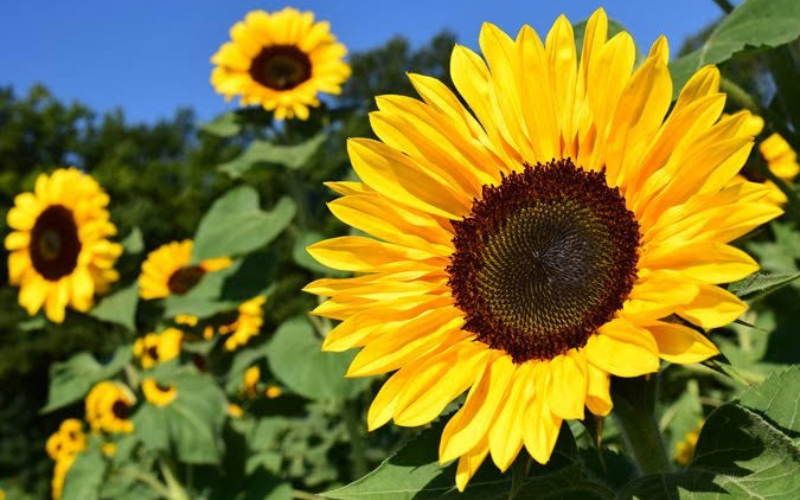
Sunflowers are not only a beautiful sight, but they also hold a significant meaning. Symbolizing loyalty, longevity, and happiness, these flowers have been cultivated for over 3000 years. Sunflowers are not just pretty to look at, they also have many uses.
They are a great source of food as their seeds are rich in healthy fats, protein and contain minerals such as magnesium and zinc. Sunflowers are also used to produce oil, which has a variety of culinary and cosmetic uses. They also come in a range of sizes, from the small dwarf varieties to the tall giants that can reach up to 15 feet in height.
| Scientific Name | Helianthus |
| Native Range | North America and Mexico |
| Flowering Season | Summer |
Tree Peonies
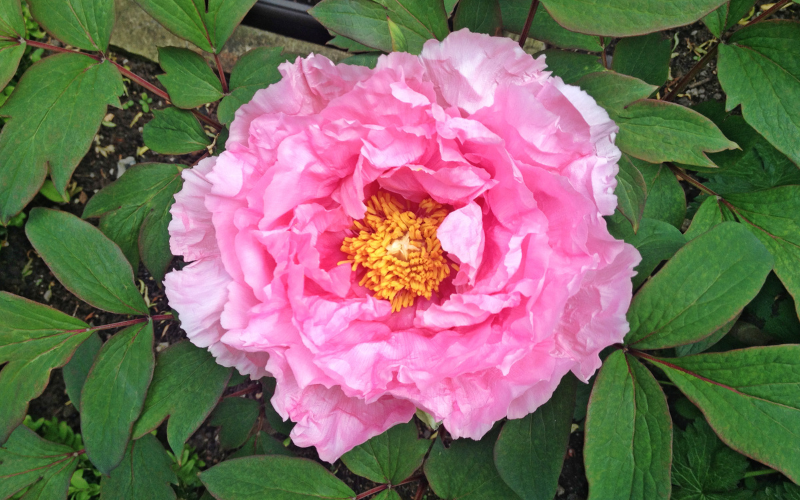
Tree peonies are a beautiful and unique addition to any garden. They are woody shrub that produces large, showy blooms in the spring. The flowers come in a variety of colors, including pink, white, red, and yellow. Tree peonies are an excellent choice for gardeners who want a low-maintenance plant that will add color and texture to their landscape.
They prefer well-drained soil and a location with full sun, although they can also tolerate partial shade. Tree peonies are also deer-resistant, making them a good choice for gardens in areas with high deer populations. With proper care, tree peonies can live for many years and continue to produce beautiful blooms each spring.
| Scientific Name | Paeonia sect. Moutan |
| Native Range | China |
| Flowering Season | Spring |
Puya Raimondii
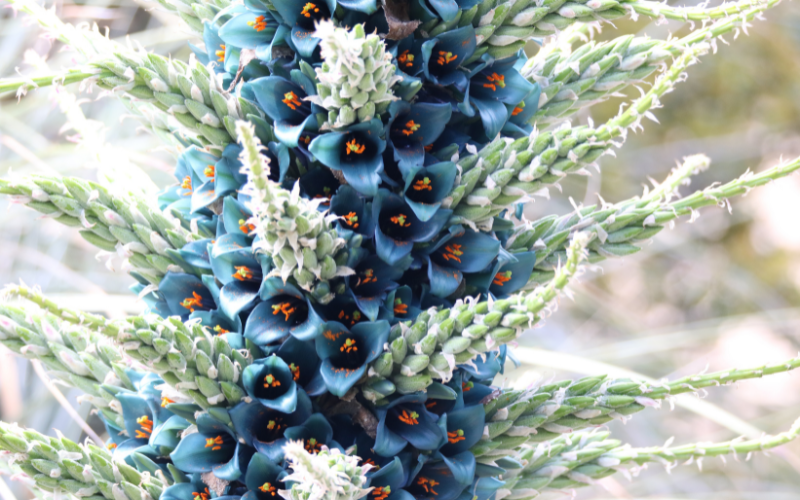
Native to the Andes Mountains of Peru and Bolivia, Puya raimondii is a rare and fascinating plant that is known for its massive size and striking appearance. These plants can grow up to 30 feet tall and produce flower spikes that can reach up to 30 feet in height as well.
The flowers themselves are a beautiful shade of blue and are surrounded by a spiny outer layer, which helps protect them from predators. Puya raimondii is not only a visually impressive plant, but it also has some unique adaptations that allow it to thrive in its high-altitude environment. For example, it has a shallow root system that helps it absorb moisture from the fog that often shrouds the Andes Mountains.
| Scientific Name | Puya raimondii |
| Native Range | High Andes of Bolivia and Peru |
| Flowering Season | Summer |
Neptune Grass

Neptune grass is a type of seagrass that is commonly found in the Mediterranean Sea and other coastal regions around the world. It is a very important plant for marine ecosystems as it provides a habitat for many different marine species.
Neptune grass can grow up to a meter in height and its leaves are long and narrow. The plant has a unique ability to trap sediment and stabilize the seafloor, making it an important tool in preventing erosion. It is also a source of food for many different sea creatures such as sea turtles, manatees, and dugongs. Neptune grass is also important for humans as it has many uses such as being used in the production of medicines, cosmetics, and even textiles.
| Scientific Name | Posidonia oceanica |
| Native Range | Europe |
| Flowering Season | They do not have distinct flowering seasons |
Titan Arum
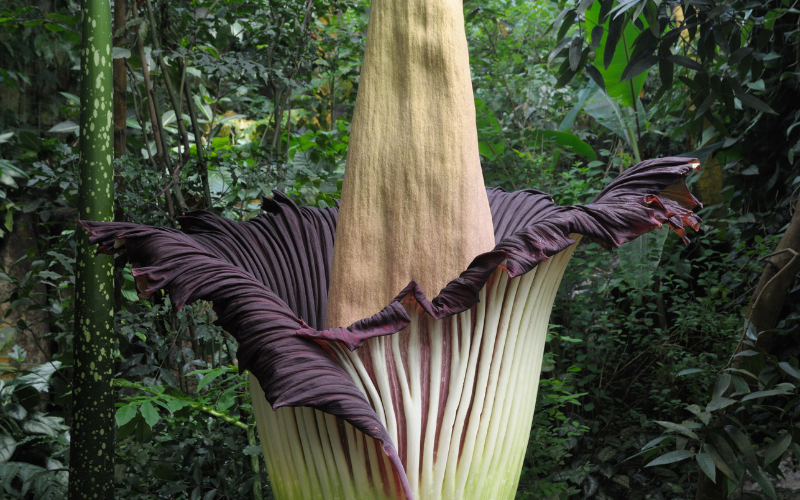
Titan arum, also known as the “corpse flower,” is one of the most fascinating plants in the world. Native to western Sumatra, Indonesia, this plant is known for its enormous size and pungent smell. When it blooms, the Titan arum can reach heights of up to ten feet and produce a smell similar to rotting flesh.
This smell attracts pollinators such as beetles and flies that are attracted to the scent of rotting meat. The plant’s large size and unique flower shape make it a popular attraction in botanical gardens and natural habitats around the world. It is also an endangered species, as habitat loss and deforestation have threatened its survival.
| Scientific Name | Amorphophallus titanum |
| Native Range | Island of Sumatra in Indonesia |
| Flowering Season | It can take several years |
Talipot Palm
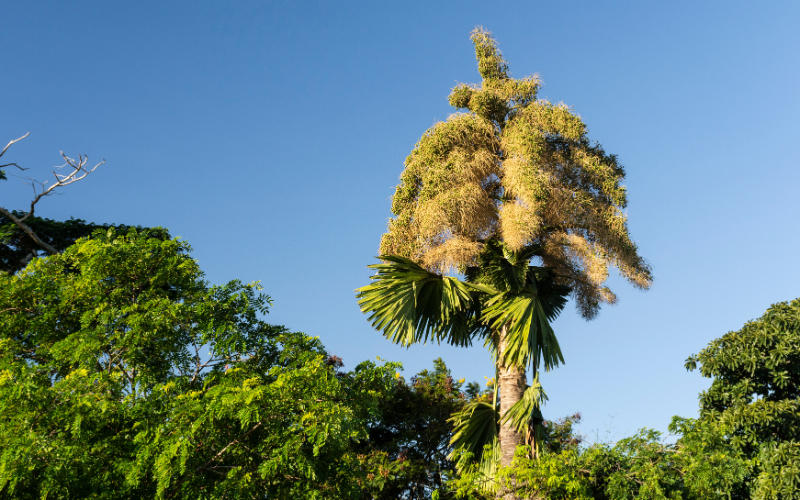
The Talipot Palm, also known as Corypha umbraculifera, is a strikingly beautiful tree and is one of the largest palms in the world, with leaves that can reach up to 25 ft long and 12 ft wide. It is native to the Indian subcontinent and Sri Lanka and is known for its striking and unique appearance, which makes it a popular choice for landscape designers.
The Talipot Palm is a slow-growing tree and can take up to 40 years to reach maturity and flower, but when it does, it produces a massive flowering stalk that can reach up to 25 ft tall and bear over a million flowers.
| Scientific Name | Corypha |
| Native Range | Eastern and southern India and Sri Lanka |
| Flowering Season | Flowering only once, when it is 30 to 80 years old |
Rafflesia Arnoldii
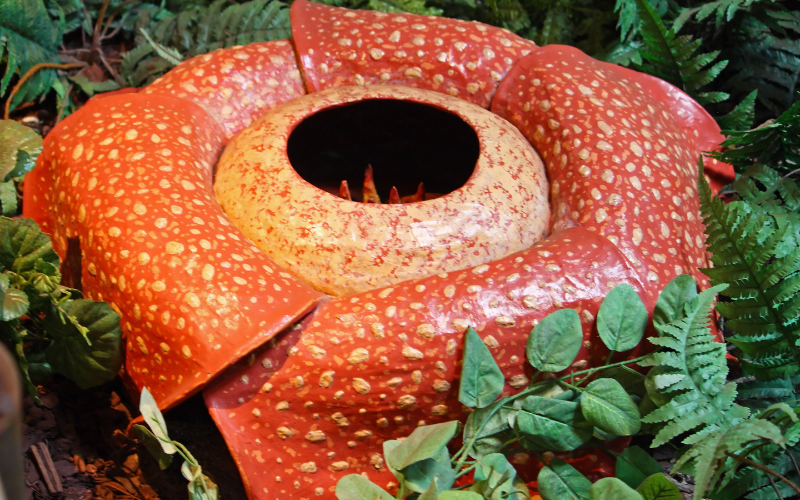
Rafflesia arnoldii is one of the most unique and interesting plants in the world. This plant is also known as the “corpse flower” due to its strong odor that resembles rotting flesh.
It is also known as the largest flower in the world, with a diameter of up to one meter. This fascinating plant is native to the rainforests of Sumatra and Borneo. The Rafflesia arnoldii is a parasitic plant, which means that, unlike other plants, it does not produce its own food through photosynthesis. Instead, it obtains its nutrients by attaching itself to the roots of a host plant.
| Scientific Name | Rafflesia arnoldii |
| Native Range | Southeast Asia |
| Flowering Season | Rafflesia arnoldii is relatively unpredictable and irregular |
Tree Peonies
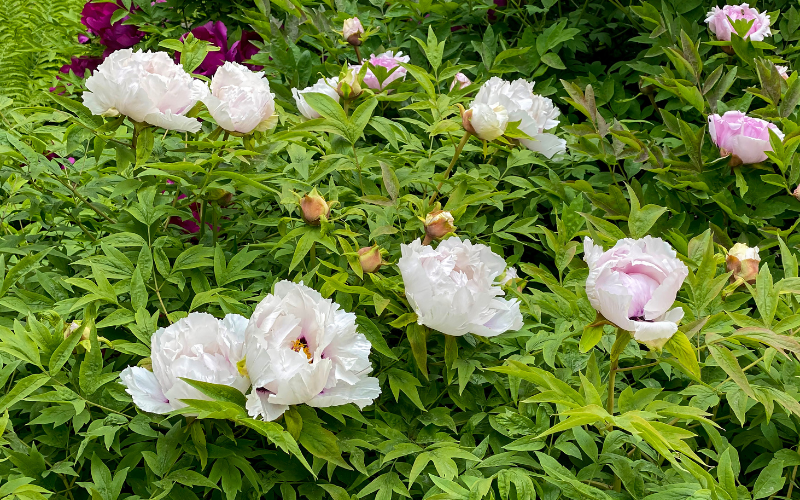
Tree peonies are a beautiful and exotic addition to any garden. They are known for their large, showy blooms that come in a variety of colors, such as white, pink, red, and yellow. These stunning flowers bloom in the late spring to early summer and can last for weeks.
Tree peonies are easy to care for and can live for many years if taken care of properly. They prefer a location with full sun to partial shade and well-draining soil. It’s important to water them regularly, especially during dry spells, to ensure they stay healthy. Additionally, tree peonies should be pruned in the late fall after their leaves have dropped.
| Scientific Name | Paeonia sect. Moutan |
| Native Range | China |
| Flowering Season | Spring |
